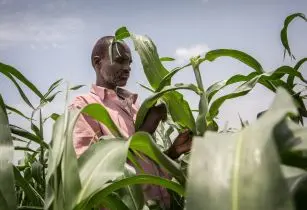To make them more sustainable, the transformation of agrifood systems across Africa needs a “cross-sectoral, holistic, coherent and coordinated policy environment,” QU Dongyu, director-general of the Food and Agriculture Organization (FAO) said at a high-level African Union (AU) event
The Comprehensive Africa Agriculture Development Programme Partnership Platform (CADP PP) is the AU’s main platform for agricultural policy dialogue, lessons-sharing and accountability. This year’s CAADP PP meeting, taking place over three days under the theme ‘Ending hunger in Africa by 2025 through resilient food systems’, brought together representatives from the African Union Commission, Ministers from the 55 AU member states, and partners.
During his participation at the High Level Partners Panel event, the FAO director-general said this is an “exciting time for Africa”. The discussion focused on how to strengthen institutions and increase investments to speed up agriculture transformation and streamline efforts towards building flexible food systems aimed at ending hunger on the continent.
Qu stressed on three key ways of accelerating change for agricultural transformation in Africa – increasing agricultural productivity, building resilience by addressing water and climate related challenges in agriculture and increasing the use of data and digitalisation.
“FAO is committed to leveraging its expertise and experience to work with key partners and stakeholders to transform Africa’s agrifood systems for a better and brighter future for all,” Dongyu said.
The panel also included representatives from the African Development Bank, USAID and the International Institute of Tropical Agriculture.
FAO has supported the AU on a number of projects to boost agrifood systems transformation. In 2021, FAO and the AU launched the Framework for Boosting Intra-African Trade in Agricultural Commodities and Services, a blueprint for expanding agricultural trade between African countries and unlocking the potential of the agricultural sector to contribute to sustainable and inclusive growth for Africa.
FAO has also worked with the AU on the Africa Open Data for Environment, Agriculture and Land initiative, which has made Africa the first continent to complete the collection of digital land use and land use change data, and in the development of policies and strategies for country-specific plans to reduce post-harvest food losses.





